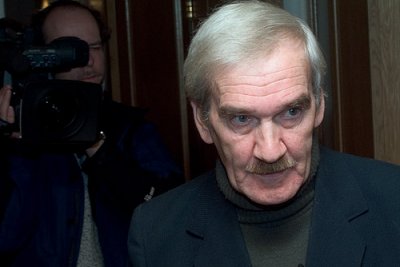Incredible(!) story from The Moscow News about something that happened in 1983 that you didn’t know about, because you were sleeping soundly in your bed. I reprint it here in full:
 The Man Who Saved the World Finally Recognized
The Man Who Saved the World Finally Recognized
Sirens blaring, warning lights flashing, computer screens showing nuclear missiles on their way, one man in charge of a red button labeled “START” – that’s start a retaliatory strike — and a roomful of people at their terminals and switchboards waiting for him to push it. Sound like a typical Hollywood Cold War cliffhanger?
It was indeed just like in the movies, says the man who was poised over the red button over twenty years ago, except “in the movies, Hollywood specialists and directors can stretch a little situation into half an hour. In our case, from the time I made the decision to when it was all over, it was five minutes max.”
Stanislav Petrov was a Soviet army officer monitoring the satellite system for signs of a U.S. attack, the year was 1983, and his instructions, if he detected missiles targeting the Soviet Union, were to push the button and launch a counter-offensive.
He didn’t. Minutes later, no missiles came; months later, the frightening data across his monitor was determined to have been a system glitch. Today, the Association of World Citizens is calling him “the forgotten hero of our time,” a title befitting the man whose responsibility had been to start World War III.
On the Spot
Half an hour past midnight on September 26, 1983, he saw the first apparent launch on his computer monitor in a glass-walled room on the top floor of the Ballistic Missile Early Warning System (BMEWS) command and control post.
“I was supposed to supervise the combat crew. When the first launch happened, everyone was stupefied. After the first launch, I started giving orders, because in the room below, where there were five switchboards, and all the operators jumped out of their seats to see what my reaction was. I can only imagine what went on at the other posts.”
The warning system was by now showing five missile launches in the U.S., headed toward the Soviet Union. The “START” command Petrov was expected to give would have started an irreversible chain reaction in a system geared to launch a counter-strike without human interference.
“The main computer wouldn’t ask me [what to do] — it was made so that it wouldn’t even ask. It was specially constructed in such a way that no one could affect the system’s operations.” All that was up to Petrov was analyzing the available information and either saying the alarm was false or giving the computer the go-ahead, as per the directive he himself wrote.
Why Didn’t He Do It?
All the data checked out, to all appearances, the system was right on target — or rather, the missiles it reported were. A couple of thoughts flashed past Petrov’s mind.
“I just couldn’t believe that just like that, all of a sudden, someone would hurl five missiles at us. Five missiles wouldn’t wipe us out. The U.S. had not five, but a thousand missiles in battle readiness.” It just didn’t seem like any scenario considered by military intelligence before.
The second thought on Petrov’s mind every time he was on duty was this:
“I imagined if I’d assume the responsibility for unleashing the third World War — and I said, no, I wouldn’t.”
The tension must have been overwhelming — did he really have the time to consider the global context of his actions?
“I always thought of it. Whenever I came on duty, I always refreshed it in my memory. At that moment, there was no time to think, I had to work, work, work.”
Petrov reported the alarm to his superiors and declared it false. Had he been mistaken, the mistake would have become obvious in minutes: the post’s detection system had a 15-minute advantage over the ground radars. No missiles rained on Soviet Union in a quarter hour; rather, in an hour, high command descended on the command post.
What Happened?
“It was a false alarm started aboard a satellite,” says retired General Yuri Votintsev, then the Commander of the Soviet Missile and Space Establishment. Votintsev raced to the command post and was the first to hear Petrov’s story after the incident.
“I noted Lieutenant Colonel Petrov’s correct actions, given the situation. Literally within a minute he informed all the command posts that the information about the launch of space vehicles is false. His actions were duly noted.”
Petrov himself tells a different story — although at first he was praised for his actions, he found himself slighted and picked on after the warning system was meticulously dissected and many bugs were found.
“When a lot of garbage was found in the way the system worked, it was uncomfortable for them to praise me — like they’re all horrible and I’m the only one who’s any good.”
Twenty-One Years Later
Several months later, Petrov retired from the army, exhausted by the stress. Twenty-one years later, Petrov, surviving on a tiny army pension in a small town outside of Moscow, is being honored for his decision by the San Francisco-based Association of World Citizens. On May 21, 2004 Colonel Petrov has joined the ranks of World Citizens and receive a financial award AWC raised for him through its website.
The director of Memorial, Russia’s historical heritage and human rights organization, Arseny Roginsky, congratulated Petrov on behalf of AWC in an awards ceremony that took place at Moscow News’ office. The only regret AWC had, he said, was that they hadn’t acknowledged Petrov’s heroic action years ago. “They believe, you see, that in this world, people who are capable of actions like that can be counted up on one hand.”

